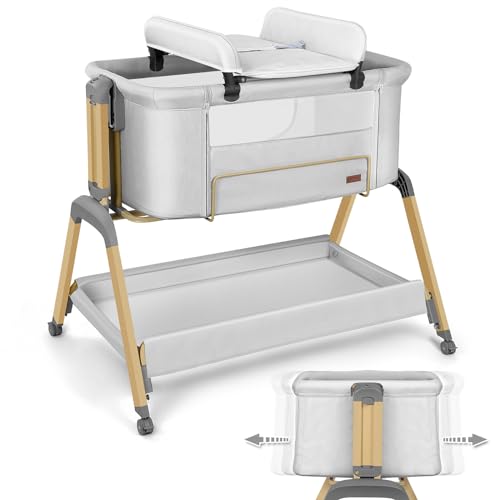The Versatility of Bedside Cots: A Comprehensive Guide to Convertible Use
As new parents start their parenting journey, one of the most vital choices includes the selection of suitable sleeping arrangements for their newborn. Amongst the various choices offered, bedside cots have gotten considerable appeal for their adaptability and convenience. A bedside cot-- likewise called a co-sleeper-- provides a safe and accessible space for the baby while allowing parents to maintain closeness during the night. This article delves into the different benefits of bedside cots, especially those designed for convertible use, the key features to consider when selecting one, and responses to some regularly asked concerns.
What is a Bedside Cot?
A bedside cot is a specifically developed crib that attaches to the side of the parent's bed. Unlike conventional cribs, which require a nursery setup, a bedside cot lets parents easily access their baby throughout the night. Convertible bedside cots take this benefit to the next level, using several performance options as your child grows.
Secret Features of Convertible Bedside Cots
Convertible bedside cots boast a variety of functions that make them an attractive choice for parents. Some essential functions include:
- Easily Adjustable Height: Bedside cots usually include an adjustable height system, permitting parents to align the cot with their own bed's height for easy access.
- Portable and Lightweight: Many bedside cots are developed for portability, making it easy for parents to move them from room to room or when taking a trip.
- Versatile Configuration Options: These cots can often be reconfigured as a standalone crib, playpen, or young child bed, making them appropriate for various phases of kid advancement.
- Safe Co-Sleeping Options: Most cots are developed with security features, including safe attachments to the parental bed and breathable mesh sides, ensuring a safe sleeping environment for the baby.
- Stylish Design: Many bedside cots include visual styles that fit perfectly into modern home design, making them an enticing addition to a bed room.
Benefits of Using a Convertible Bedside Cot
Bedside cots for convertible use deal numerous advantages, including:
- Promotes Bonding: Having the baby nearby promotes psychological bonding and makes nighttime feeding and calming simpler for parents.
- Safe Co-Sleeping: It lowers the threat related to conventional co-sleeping practices, using a secure sleeping environment for the child.
- Economical: The ability to transform into various types of beds suggests parents do not require to purchase several sleeping solutions as their kid grows.
- Convenience: Easy access to the baby can make nighttime regimens smoother and less stressful.
How to Choose the Right Convertible Bedside Cot
When selecting a convertible bedside cot, parents need to think about the list below factors:
- Safety Standards: Ensure that the cot satisfies all safety guidelines and requirements, providing peace of mind while your baby sleeps.
- Material Quality: Opt for cots made from non-toxic materials, as babies are vulnerable to chewing on crib railings and furniture.
- Size: Select a cot that fits well within your offered space and can accommodate a growing kid conveniently.
- Relieve of Use: Look for features like detachable and washable covers, ease of assembly, and height adjustments for benefit.
- Cost: While a high cost does not constantly relate to much better quality, it is important to discover a cot that fits your budget while still offering the necessary security and convenience.
Table: Comparison of Popular Convertible Bedside Cots
| Brand name | Key Features | Cost Range | Safety Certification |
|---|---|---|---|
| Brand name A | Adjustable height, removable sides | ₤ 200-₤ 300 | JPMA Certified |
| Brand B | Lightweight, easy to fold, portable | ₤ 150-₤ 250 | ASTM Compliant |
| Brand C | Streamlined design, multi-purpose functionality | ₤ 300-₤ 400 | CPSIA Approved |
| Brand name D | Eco-friendly products, adjustable functions | ₤ 250-₤ 350 | Fulfills CPSC Standards |
Frequently Asked Questions (FAQs)
1. Is a bedside cot safe for my baby?
Yes, a sound bedside cot adhering to safety requirements is safe for your baby. Ensure it is firmly connected to your bed and does not pose spaces where the baby might get trapped.
2. At what age can my baby use a bedside cot?
Most bedside cots can be utilized from birth until the child is roughly 6 months old or begins to reveal indications of mobility (e.g., rolling over or staying up).
3. Can a bedside cot be used for several kids?
Yes, a quality convertible bedside cot can be utilized for numerous kids, supplied it remains in good condition and fulfills safety requirements.
4. How do I clean a bedside cot?
Most bedside cots include detachable, machine-washable covers. Regularly wipe down Baby Co Sleeper Crib with a mild soap solution, and make sure to look for any wear and tear to preserve security.
5. How does a bedside cot vary from a regular crib?
The main distinction is the attachment function of the bedside cot, which allows parents to have their baby close during sleep. Routine cribs are standalone units that need a different nursery space.
Purchasing a bedside cot created for convertible use can substantially boost the parenting experience by supplying a versatile, convenient, and safe sleeping environment for both parents and their newborns. By understanding the features, benefits, and vital factors to think about, parents can make informed decisions that accommodate their household's needs. With the best bedside cot, parents can reduce the transition into parenthood while cultivating a caring bond with their kids.

